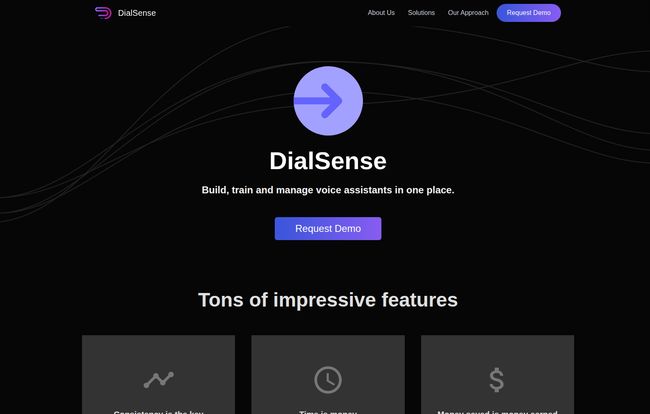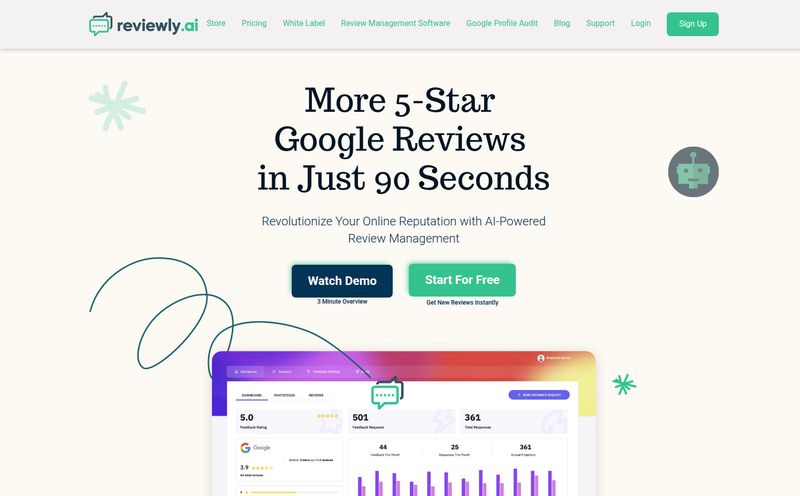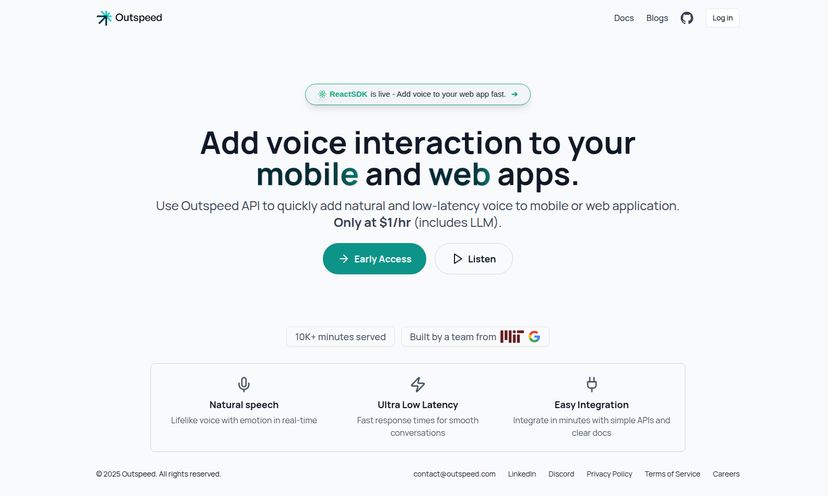Nobody, and I mean nobody, enjoys calling customer service. You navigate a labyrinth of button presses only to be serenaded by 15 minutes of terrible hold music before you can even speak to a human. As a business owner, that's a customer experience nightmare. As an SEO and traffic guy, I see it as a colossal, flashing red sign that says "LEAKING CUSTOMERS HERE!"
For years, we've been told chatbots are the solution. And they're... fine. For some things. But voice? Voice is where the real magic, the real human connection happens. The problem is, human-led voice support is expensive, hard to scale, and isn't available at 2 AM when your customer in another time zone has an urgent question. I've been watching the conversational AI space for a while, and a lot of tools promise the world but deliver a clunky, robotic mess. So, when I came across DialSense, I was skeptical. But after digging in, I have to say, I'm genuinely intrigued.
So, What Exactly is DialSense?
Picture your absolute best customer service agent. They're patient, always on-brand, know your products inside and out, and have an encyclopedic memory. Now, imagine they could work 24/7, speak to hundreds of customers at once without ever getting flustered, and cost a fraction of a traditional call center team. That's the core promise of DialSense. It's an AI platform from a company called Dynopii that lets you build, train, and deploy your own army of these super-agents.
It's not just a robocaller. It's a voice-first conversational AI designed to handle the bulk of your inbound customer interactions. Think of it less as a phone tree and more as a highly-trained digital employee who handles the frontline, so your human experts can focus on the truly complex stuff.
The Features That Actually Matter
Any platform can throw a list of features on a landing page. But what actually moves the needle for a business? After looking at DialSense, a few things really stood out to me as game-changers.
No More "Your Call is Important to Us" Lies
This is the big one. The single most frustrating part of customer service is waiting on hold. DialSense boasts a zero wait-time resolution. When a customer calls, the AI picks up immediately. Instantly. This isn't just a small improvement; it's a fundamental shift in the customer experience. A 2022 Talkdesk report mentioned that long wait times are a top reason for customer frustration. By eliminating the wait, you're eliminating the #1 reason a customer starts the conversation already angry. That's a massive win.
Slashing Costs Without Slashing Quality
Let's talk brass tacks: money. The cost of running a 24/7 call center is staggering. Salaries, benefits, training, infrastructure... it adds up. DialSense pitches a significant reduction in these costs by automating the repetitive, high-volume queries. Think "What's my order status?", "How do I reset my password?", or "What are your hours?" These are the calls that clog up your phone lines and burn out your agents. By letting an AI handle these, you free up your human team to tackle the high-value, complex problems that actually require their expertise. This doesn't just cut costs; it improves your human agents' job satisfaction and efficiency.

Visit DialSense
A Voice That's Consistently Your Voice
One of my initial fears with AI voice tools is that they make your brand sound generic and robotic. DialSense seems to have put some real thought into this. The platform emphasizes training the AI on your specific branding and tone. Do you want your brand to sound professional and efficient? Or warm and friendly? You can bake that right into the assistant. This ensures that every single customer gets the same, consistent experience that aligns with your brand identity, every single time. No more roulette where a customer's experience depends on which agent they happen to get and whether that agent is having a good day.
My Honest Take: The Good, The Bad, and The AI
Alright, no tool is perfect. As someone who’s seen countless platforms come and go, I've learned to look past the marketing hype. Here’s my breakdown of DialSense.
The Advantages of DialSense
The upsides are pretty clear. You’re looking at a dramatically improved customer experience with that 24/7, instant support. Happier customers lead to better reviews, more repeat business, and a higher lifetime value (LTV). You're also gaining massive operational efficiency. By automating the grunt work, your team becomes more productive, which can lower your customer acquisition cost (CAC) over time as you retain more customers and operate more leanly. And the consistency is a huge, often underrated, benefit for building a strong, reliable brand image.
Where It Might Stumble (Let's Be Real)
This isn't a magaic wand you wave and all your problems disappear. First, there's an initial setup. You have to train the AI. This means feeding it information, defining conversation flows, and testing it. It's an upfront investment of time and resources. Second, AI still has its limits. For a truly unique, emotionally charged, or multi-layered complex problem, you'll still need a seamless hand-off to a human agent. DialSense isn't designed to replace your expert humans, but to augment them. Finally, you do become dependent on the technology. If the platform goes down (which can happen to any cloud service), your frontline support is down. It's just a modern business reality we have to plan for.
Who is DialSense Really For?
So, who should be hitting that "Request Demo" button? In my opinion, DialSense is a fantastic fit for businesses with a high volume of repetitive inbound calls. Think e-commerce companies fielding questions about orders and returns, SaaS businesses needing Tier 1 technical support, or even local service providers managing appointments and basic inquiries.
If you're a solopreneur with five calls a week, this is probably overkill. But if you have a dedicated customer support team—or you're looking to build one without breaking the bank—this is exactly the kind of force multiplier you should be investigating. It's for businesses ready to scale their customer communication and stop treating customer service as just a cost center, but as a growth engine.
Let's Talk Money: The DialSense Pricing Question
You’ve scrolled this far, and you're wondering about the price. I looked, and like many B2B SaaS platforms in this space, DialSense doesn’t list its pricing publicly. And honestly, that makes sense. The cost will likely depend on factors like your call volume, the complexity of the AI assistant you need to build, and any potential integrations with your existing CRM or helpdesk software.
This isn't a one-size-fits-all plugin. It's a custom solution. The next step is to use that "Request Demo" button on their site. That’s your opportunity to show them your use case and get a tailored quote. Don't let the lack of a pricing page scare you off; it's standard practice for a tool this specialized.
Frequently Asked Questions
What happens if the DialSense AI can't answer a customer's question?
This is a critical point. A well-designed system will include a seamless escalation path. The AI should be able to recognize when it's out of its depth and offer to transfer the customer to a live human agent without them having to hang up and call back.
Can DialSense integrate with my existing CRM like Salesforce or HubSpot?
While not explicitly stated, integrations are the lifeblood of tools like this. It's one of the most important questions to ask during a demo. A good integration would allow the AI to pull customer data for personalization and log interaction details back into your CRM.
How long does it take to set up and train a DialSense voice assistant?
This will vary wildly based on complexity. A simple FAQ bot could potentially be up and running relatively quickly. A more complex assistant tied into multiple systems will require a more involved setup project. Expect a discovery and implementation process.
Is customer data secure with an AI platform like DialSense?
Any company handling customer data, especially with AI, must prioritize security. You should inquire about their data privacy policies, compliance with regulations like GDPR or CCPA, and data encryption practices during your initial conversations.
My Final Verdict
Look, the world of customer service is changing. Sticking with an old-school, understaffed, 9-to-5 phone line is a recipe for getting left behind. Tools like DialSense represent the future of business communication—not a future without humans, but one where humans are freed up to do what they do best: solve hard problems and build real relationships.
While it requires an upfront investment to get it right, the potential ROI in terms of cost savings, improved efficiency, and—most importantly—happier customers is enormous. If you’re feeling the pain of an overwhelmed call center, I think getting a demo of DialSense is a no-brainer. It might just be the smartest hire you make all year.
Reference and Sources
- DialSense Official Website - Product information and features.
- Talkdesk - Call Center KPIs & Statistics for 2022.



